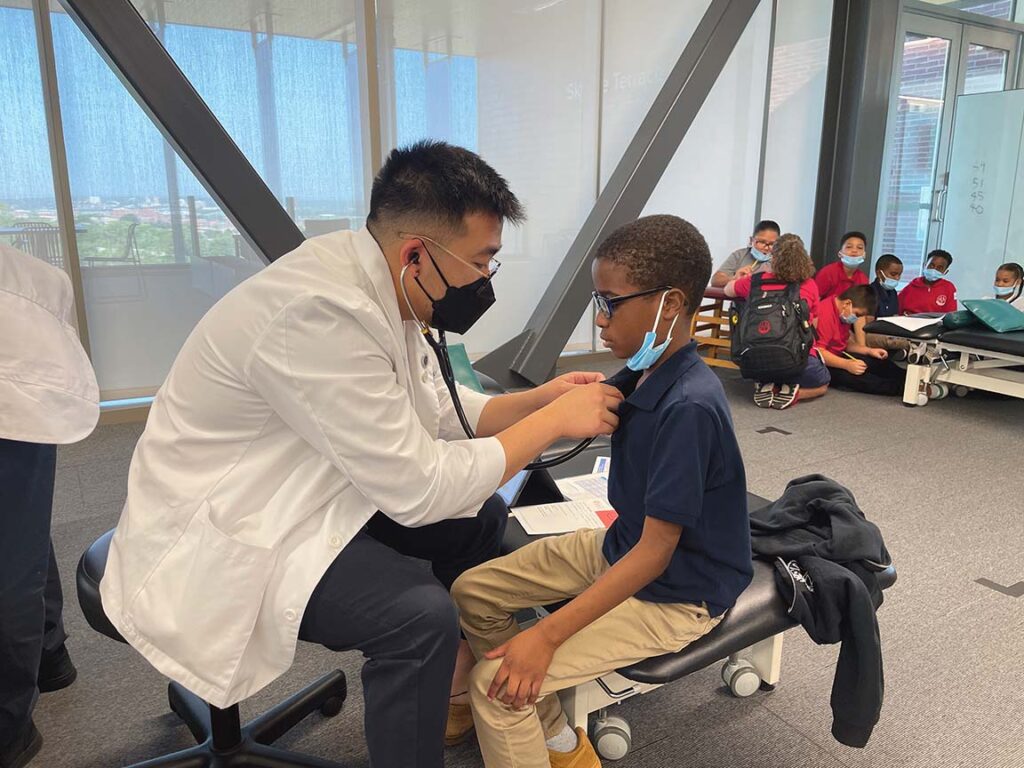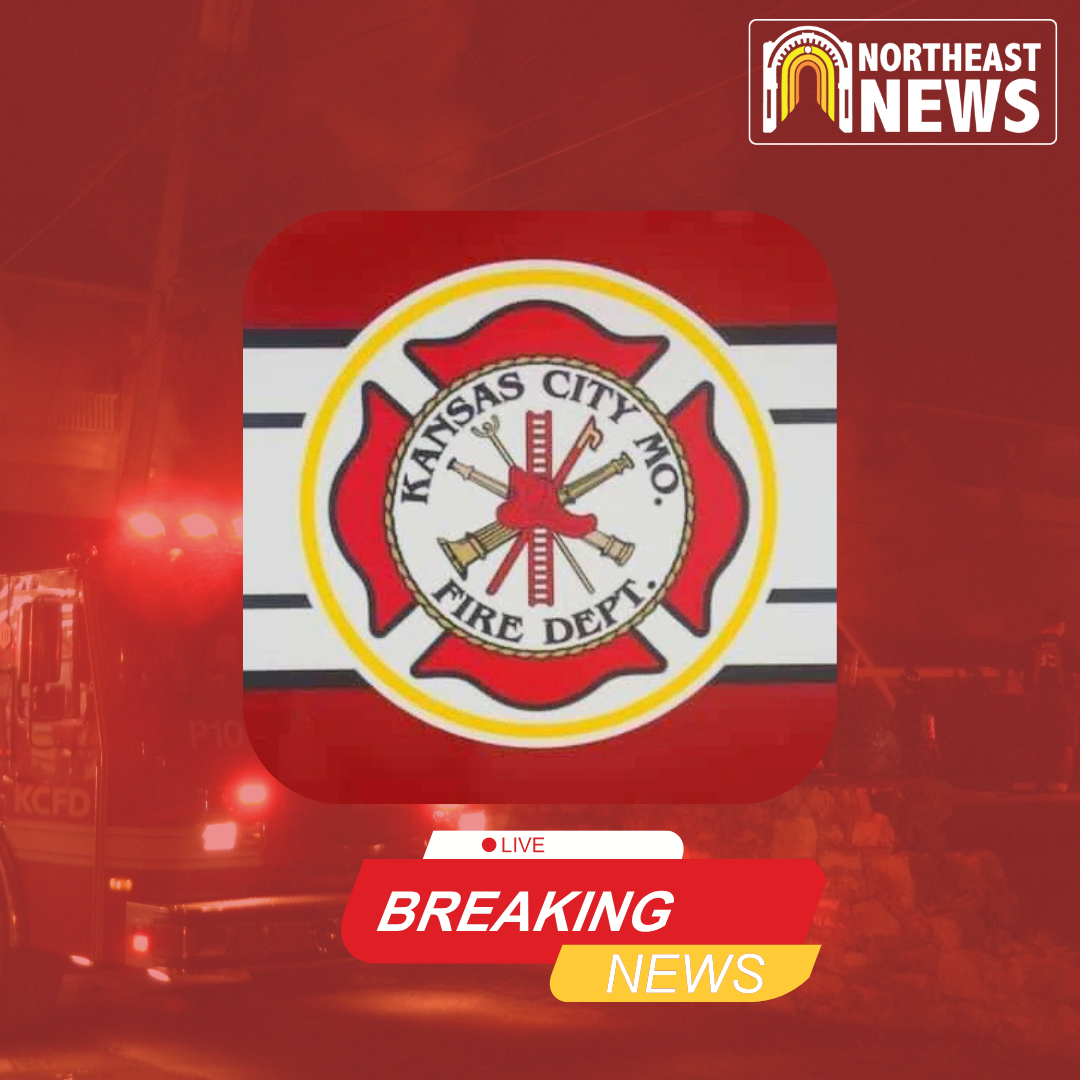
Abby Hoover
Managing Editor
On Thursday, Sept. 8, the Kansas City University (KCU) Score 1 for Health Program hosted nearly 400 elementary students from Scuola Vita Nuova (SVN), providing physical assessments, dental, and vision screenings, STEM activities, mindfulness and movement in the form of belly dancing.
SVN students walk to the KCU campus at Independence Avenue and The Paseo Boulevard, accompanied by their teachers and other staff, from their school at 535 Garfield Ave.
Score 1 is an early clinical experience for medical students, who under the supervision of faculty, perform health screenings for more than 13,000 children each year. In the past, KCU students have identified health concerns such as heart murmurs, eye disorders, pre-diabetes and oral health concerns.
In the new state of the art Center for Medical Education Innovation, their team of nurses and community health care workers are then able to help families access needed health care providers and services, which can be life-changing for their children.
In addition to KCU students, students from Johnson County Community College and Avila University’s nursing programs were on site providing vision and height/weight screenings.
The entire KCU campus gets involved in this day, with faculty and staff providing valuable STEM (science technology, engineering, math) active learning opportunities for the school children, including a simulation lab, computer deconstruction, helping with garden harvest and salsa making, an introduction to belly dancing, mindfulness and meditation exercise.
Dr. Meghan Wendland, faculty at University of Missouri – Kansas City (UMKC) School of Dentistry, and two third-year dental students were also on site in the physical screening area, assisting medical students with an oral health screening.
“I think it’s tremendously important because we often practice so siloed that it’s great to not only get students together to learn how to work together in an education setting, but also learn how we can collaborate on providing services too, so hopefully in the future, our health care system will reflect that,” Wendland said.
Dental student Nash Harvey said it’s very important to start seeing a dentist very early on in childhood.
“I have patients now that come into the school with me, and they’re like, ‘Man, I wish I got this started way earlier. I can tell my whole health by my mouth, if this tooth starts hurting, then my whole body starts to ache.’” Harvey said. “The earlier you can stop it, the better it is long term, it’ll be a lot healthier long term, especially kids.”
He appreciates the opportunity to work with and practice his skills on children.
“It’s really great though, getting to see all the kids, seeing their faces light up, it’s just fun talking to them,” Harvey said. “They all got really good personalities.”
UMKC has been partnering with Score 1 since the beginning of the program.
“There is a lack of oral health training in the medical curriculum, so we’ve always been there to partner and provide that aspect to train the students and the staff, but also provide that interprofessional collaboration piece,” Wendland said. “I think if you were to walk around and do some of the exams with us, you would notice that there is a lot of untreated decay, which is indicative of a lack of access to care. So a need that’s there that’s not being taken care of for myriad reasons. That’s why we try to work on these partnerships and that’s why these partnerships are important because it’s also gives visibility that UMKC School of Dentistry is there to meet those needs for families that want us to.”
After the exams, all of the students that have dental needs receive letters home to parents, which is the first step in making sure that they find a dentist to visit regularly as early as possible.
The visit provided an unique opportunity for both medical students and the children. Medical students began by looking inside the children’s mouths and conducting an oral health screening. If they had a question or concern, they called over a dental student to help them understand what they were looking at. Then, the children were screened for overall health.
“This is our biggest on campus event, but we had screenings throughout the first half of this year, and there are some days when we visit three schools, but there are some days where all of our KCU students span out across the community and we’ll have five schools that this kind of screening happens at on a given day,” said Dr. Ray Newman, Chief Medical Officer for Score 1 for Health and Associate Professor of Pediatrics.
KCU’s mission includes improving the well-being of the communities it serves. Newman said it’s really important for KCU’s medical students to see how they can use their education or their position in the community to be involved and to help, if help is needed.
“One of the big things with Score 1, it’s not just a student event, but our team of nurses and community health workers, if there’s anything noticed that’s abnormal – if they fail a vision screen or if their blood pressure is too high, they go back out there, maybe one time, maybe two times, to schools and rescreen the kids and then if they’re still positive, if there’s something that we need to look into, they they try to help the parents get hooked in with care,” Newman said. “So it’s important for our medical students, and it’s important, we hope, to the kids in the community, particularly those kids that may face obstacles in accessing care.”
Score 1’s health screening program began 22 years ago, starting as an independent organization and then being adopted by the school.
“The school itself has been very generous in supporting the program,” Newman said. “I think they see it as a way to help fulfill that mission statement.”
The program serves some of the schools in the Kansas City, Grandview, Raytown and Hickman Mills school districts.
“We also kind of hope that elementary school kids who may not have someone in the medical profession in their family, that they see these young, energetic people and say, ‘Hey, I can do that,’” Newman said. “We try to reinforce the point to our medical students and they’re role models, also.”
The students conducting health screenings were second year medical students.
“This Score 1 event has early clinical skills, which has become a big thing in medical education, and this is a big early clinical skills event for students,” Newman said. “Of course, they’re closely supervised by us, the faculty.”
Medical students are getting quality hands-on learning, with the added benefit of interprofessional education.
“We try to bring people from different professions together so they can learn together and work together,” Newman said. “They’re trying to show our medical students how to work in teams, try to show the value of everyone’s role on the team, try to get everybody to understand that. It takes a village.”
One thing the communities they serve have in common is that a lot of the kids are really mobile. Their families move a lot, whether it’s because of a job or housing. While some of the children have primary care physicians, many do not.
“Particularly those kids that have an insurance plan that’s part of the Missouri Medicaid system, they may have an assigned physician, but they don’t always associate with that doctor or that clinic, so we try to – if we identify a problem, and then if we have contact with the parent – then we try to educate them as far as you need to go here,” Newman said.
Newman said they’re trying to get everyone to identify with a medical home, a place that works for them and where they feel safe.
“That’s a challenge because so many people have such complicated lives, that they can’t take a day off to have a physical done, so emergency rooms tend to be the default for most things they need, and then many people make use of the health department for immunizations,” Newman said.
Allisyn Thurston, Director of Curriculum & Professional Development at SVN, said for a lot of her students, these are the only physicals and chances that they get to have this medical attention.
“We’re just so excited for all of our kids to get the opportunity to see the medical students who give them the physicals and then identify any needs that they may have, which then lots of times they then will follow up with their primary care doctors, but lots of times they don’t know that there’s a need to begin with,” Thurston said. “It’s so great to be able to partner with them and them be so close to us. Our kids love coming down here.”
Getting to see future doctors in action is part of SVN’s mission to inspire its students to pursue higher education.
“They love getting to see the doctors and then also they have some great activities for the kids while they’re over here and they get to eat lunch, so not just getting this physical needs met, but having fun in their own community with people that are right down the street is just great for them,” Thurston said.
Especially with the middle school students, they’re beginning to talk about colleges and universities. With the younger students, they make badges with their photos that read “future doctor,” which Thurston said is always impactful.
“Score 1 works with lots of schools and they go to the school, I just think our opportunity that we have is so unique that we get to come to them and be on campus and we’re just really thankful for that opportunity,” Thurston said. “Most kids don’t have lots of opportunities to be on college campuses. This campus is just so beautiful and I just think that exposure is so great. You have to go to elementary school, you have to go to high school. They don’t have to go to college, and so it’s just great to open those conversations with them.”
Thurston said it’s never too early to discuss college with students, especially making sure those who would be first generation college graduates in their families know it’s an option.



















